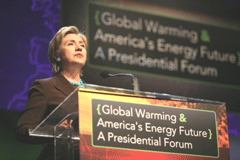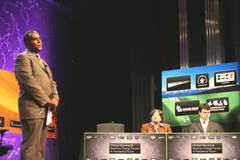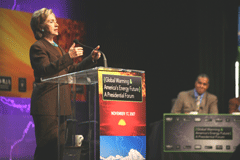Clinton on Climate Change
Air Date: Week of November 23, 2007

(Photo: Laura Kleinhenz)
If she were president, what would Hillary Clinton do to combat climate change? Living on Earth host Steve Curwood moderated the first-ever presidential candidates forum on global warming, where Senator Clinton answered just that question. Tune in for a substantial discussion about one of the most serious issues the next commander-in-chief will face.
Transcript
CURWOOD: It’s Living on Earth. I’m Steve Curwood. New York Democratic Senator and presidential hopeful Hillary Clinton described an ambitious plan to tackle climate change when she took the stage at the first-ever presidential forum on global warming. I moderated the forum which took place in the Wadsworth Theatre in Los Angeles on November 17th. Senator Clinton says her plan would reduce the country’s global warming gas emissions 80 percent by mid century, and dramatically increase auto fuel efficiency and renewable sources of electricity. Here’s an excerpt from her remarks:
CLINTON: From day I take office as of noon on January 20th, 2009, I will issue an executive order that every new federal building has to be carbon neutral, from design to construction. I have proposed a $50 billion strategic energy fund to double investment in energy research and you know how we’ll pay for it—by taking the tax subsidies away from the oil companies because it’s clear they don’t need our money to make a high profit.
[APPLAUSE]
CLINTON: And I think it’s very important to start talking about green collar jobs. Everybody knows about blue collared jobs and white collar jobs, we’re going to put five million Americans to work making America green.
[APPLAUSE]
CLINTON: When I am president, the U.S. Treasury will issue energy independence bonds, dedicated to the strategic energy fund. I’ll encourage Americans to reduce their energy use and shrink their carbon footprint and place the savings into these bonds. During World War II, Americans purchased more than $33 billion dollars in war bonds. We can tap that same patriotism. After 9-11, this president said ‘go shopping.’ It was a tragic missed opportunity. As president I’ll say ‘go green.’ And I think that Americans will respond.
[APPLAUSE]
CURWOOD: Well, thank you so much, Senator. But here’s a difficult question: the last three presidents of the United States, each in their own way have declared that they’re going to take on climate change. George Bush, the elder signed the UN Framework Convention on Climate Change. Your husband’s administration signed the Kyoto Accord. When Mr. Bush was campaigning for office, he pledged that he would list carbon dioxide as a pollutant.

Forum moderator Steve Curwood, and panelists Mary Nichols of the California Air Resources Board and David Roberts of Grist Magazine. (Photo: Laura Kleinhenz)
CURWOOD: Well, the point is, is that every one of these men have said—
CLINTON: That’s the problem to start with, I think!
[AUDIENCE LAUGHS AND CHEERS]
CURWOOD: So, that’s your idea of a first. If you’re elected, you will not only be the first female president of the United States, but the first president of the United States, the first president of the United States to have an effective policy that would actually reduce our greenhouse gas emissions? So, how do you do this? These people all started with the intention of doing it; they weren’t able to deliver. What’s the magic you bring? What’s your secret that you can, in fact, deliver?
CLINTON: Well, number one: people’s awareness and understanding of this issue is much greater than it was, even seven years ago. And certainly 10 or 15 years ago. It is a combination of the news and people’s own experience that is beginning to kind of penetrate what people like Vice President Gore and some of you have been talking about for years. So that has a salience in the political system that we haven’t seen until very recently. Secondly, it is significant that we are moving toward a global commitment on this. If you look around the world and you see the actions that are being taken by the European Union or Japan, or you look and understand how much more renewable electricity is being generated by countries like Denmark or Germany and others, it ties into the sense among Americans that we’re just not keeping up. And we need, once again, to reassert our global leadership on an issue of significance. And finally, you have to have a commitment from a president at the time when the electorate and elected representatives are finally ready to act. And that’s what I think we will have when I become president. Because we have people in the Congress now who are much more open, much more dedicated than they ever have been before. We had a renewable portfolio standard in the House. We have CAFÉ standards in the Senate. That’s never happened in the last 10, 15 years. So there is a much greater readiness in the political system. So if it takes leadership, I would meet every three months with the leaders of the major greenhouse gas emitting countries. We have a group of countries—the EU, the United States, Canada and Mexico, Russia, China, India, Brazil, South Africa—that are basically responsible for 70 percent of the current greenhouse gas emissions and, I think, if presidential leadership drove this we would make progress internationally and here with a congressional agenda. So, I’m actually quite confident and optimistic that we can make this high priority and bring some very positive change about.
[APPLAUSE]
MARY NICHOLS: Thank you, Senator.
CURWOOD: Thank you. So the pledge is, it will be done in your administration, it will be done. That’s the pledge.

Los Angeles' Wadsworth Theatre shortly before the climate change forum began. (Photo: Laura Kleinhenz)
CURWOOD: When the Clinton administration is over, emissions will have been reduced in this country.
CLINTON: Yes.
CURWOOD All right, you heard the pledge.
[APPLAUSE]
NICHOLS: Okay, now, let, let’s talk about how the campaign can help to make this happen. I think we all remember what happened to healthcare.
CURWOOD: Panelist and California Air Resources Board Chair Mary Nichols.
NICHOLS: What can you do through the campaign and through your speeches and other actions in the places where climate isn’t yet on the agenda to give yourself what you need to combat what we know will be the multimillion dollar ad campaigns that will be coming at you and the rest of us from the coal industry and others—
CLINTON: Right.
NICHOLS: Opponents.
CLINTON: Well, I’m, I’m trying to do that in the campaign now, in that I rolled out this energy climate change agenda over a week in Iowa and New Hampshire. I speak about it everywhere that I go to try to kind of get it into the bloodstream of the presidential campaign. That’s the first issue, we’ve got to make it something that people you know, actually turn into a voting issue. And here’s where all of you come in, because you have to help this become a voting issue, not just in California, but in other states, as well. That’s why this forum is so significant because we need lots and lots of people who come to presidential events and not just the Democrats, but the Republicans, as well, asking questions, standing up and saying, ‘This is an important issue to me, personally, this will influence my vote.’ So, it’s a two-way street – the candidates have to be talking about it and then we need people who are already committed and active to turn it into a voting issue.
[APPLAUSE]
CLINTON: You know, I certainly remember very well healthcare. That taught me a lot of lessons. One was that everybody’s for change in general, but when it gets to be particular people start peeling off. And everybody is also worried that people in politics are not going to be pure enough, and then the perfect becomes the enemy of the good. So, as a, perhaps, thought that you might take away from this forum – there is no way that we will ever produce a piece of legislation that can get through the Congress that every one of you will agree with. But, incremental change in America, except in moments where the entire country recognizes we’re in a crisis, like being attacked at Pearl Harbor or we had that opportunity after 9/11 if there’d been another president, if Al Gore had been president we would have had an energy and climate change program after 9/11. But, when we actually go to the hard work of making the change then it’s going to be imperative that people stick together and that we stand united against the inevitable attacks coming from the other side. Because, ultimately, it is imperative that we get something passed and that we begin to implement it because that will persuade Americans that what we’re talking about is not going to be too disruptive, not going to undermine their quality of life or their standard of living, that it is actually going to create opportunities that are going to produce more jobs, that are going to lower their utility bills, that are going to give people a chance to make socially conscious choices. So, there’s a lot we can do, but we’re going to have to put together a very smart, broad-based political coalition to withstand, as you say, the inevitable attacks that will come.

Senator Hillary Clinton at the Presidential Forum on Global Warming and America's Energy Future.(Photo: Laura Kleinhenz)
CURWOOD: Thank you, Senator.
ROBERTS: Thank you, Senator.
CURWOOD: Panelist David Roberts of Grist-dot-org.
ROBERTS: Your last answer is a good segue into my question in that there is a bill currently in the Senate, currently going before your environment committee, the Lieberman/Warner cap-and-trade bill and here we have sort of test case of political pragmatism versus political idealism. If you ask environmental groups, this bill falls short of your stated principles and your plan in a number of ways- in the giveaways to polluters and the targets and a number of other ways. On the other hand, it does seem to be the bill that has a consensus, some bipartisan consensus behind it. So, I would like to know, very concretely, if the bill comes up for a vote as currently constituted, would you vote for it? What will you do to try to improve it? And would you ever consider voting it down and waiting for something better next session?
CLINTON: The bill needs a lot of improvement it is not the bill that I would write. It’s not that bill that Barbara Boxer would write, and I don’t think anybody can question Senator Boxer’s credentials as someone who stands and fights—
[APPLAUSE]
CLINTON: -- as hard as she can. And I think what Chairman Boxer, because she is the Chair now of the Environment Committee, is trying to do, is to improve the bill, create a context in which that bill can lay down a marker because we’re well aware that no matter what comes out of the Committee, there will be a big fight on the floor and if something were to pass the Senate and the House, it would likely be vetoed by George Bush. So, the question that people like Barbara Boxer and I are asking is—what is the strongest bill we can get out of the Environment Committee right now? And we’re not sure yet, because we’re still working on that. So, I can’t tell you how I will vote because I don’t know what the final bill is going to be. I want a cap-and-trade system with 100 percent auction. There are other, sort of benefits that go to the existing industries that are polluting . On the other hand, we have never gotten this far before. So I’m going to try to strengthen the bill, I’m going to continue to you know, work with my colleagues and see where we end up. But, at the end of the day, it really comes down to a, a very, you know, pragmatic assessment – is getting a bipartisan bill, where Republicans actually vote for something an important first step? And you can look at that from either perspective. Now, I’m told that there are a number of environmental groups that actually support Barbara’s strategy, I know there is at least one that is adamantly against it but there are a number that I’m told are supporting it. So, it’s not a cut or dried issue. Uh, I know people are turning it into a political issue, it’s the political season, there’s one environmental group running ads against me in Iowa, basically saying that if I don’t vote against the bill in Committee, there’s something, you know, terribly wrong with me – and I, that is not useful, that gets back to the point that I said earlier – this is hard work and Democrats now are in charge by a very narrow margin in the Senate, we have one of our leading environmentalists, Barbara Boxer, chairing the Committee, I think we ought to give her a little more credit for political smarts than whatever this group is claiming in Iowa. So I don’t know where we’re going to end up, but we’re trying to make it stronger.
[APPLAUSE]
CURWOOD: There’s not much time left, Senator, but, I wanted to turn it in another direction for a moment. Uh, that’s in foreign policy in this question of climate change. Uh, this country’s in a very difficult position – we pledged as part of the Kyoto Process that we would go first, instead we’ve been pointing our finger at China and India saying, ‘we’ll they’re not doing anything, why should, why should we?' Um, we have a billion people, the IPCC says that are at a great risk of going hungry or getting drowned because of the effects of climate change – how would you restore America’s credibility in the foreign policy community on this issue of climate change?

Steve Curwood listens on while Senator Clinton grabs the crowd. (Photo: Laura Kleinhenz)
[LAUGHTER, APPLAUSE]
CLINTON: -- and I think that—that’s why I emphasize taking leadership on a, in a post-Kyoto world. I’m hoping that we get a good framework coming out of Bali and then in the follow-on meetings but I think it’s clear that the Administration won’t do anything of any significance – and, so, they’ll leave office, we will have lost eight years and we’ll have to play a lot of catch-up. So, I intend to immediately move to try to convene a meeting of the countries that are the biggest emitters, including China and India. I think it is somewhat bad form for the United States to be pointing fingers at China and India, since we have by far, emitted more greenhouse gas emissions over the last century than they have and they are going to rapidly, unfortunately, make up lost time, unless they begin to change. So, I think we need to do several things simultaneously
I think there’s a lot that we could do together with China and India and it’s especially important with China because I don’t think that we want to be in a position of looking as though we are trying to slow down the rising living standard in China—that is not going to be a very convincing argument to make to the Chinese government or the Chinese people. But, if we’re willing to say, as I say in my plan—look, if you’re going to continue to use coal, you have got to have immediately demonstration projects about carbon sequestration and you’ve got to move immediately to see what kind of technological fixes there are and why don’t we work with China to have some of those demonstration projects there. If you’re going to be focusing on renewables instead of trying to have a nuclear deal with India as the only way we’re trying to help India’s energy shortages, why don’t we talk about solar arrays, why don’t we talk about wind, why don’t we talk about geothermal, and actually use some of our foreign aid and our expertise – not just from the public sector but from the private sector and the not-for-profit sector, to set up some demonstration projects. We need to show countries like India and China that we’re not trying to slow their development down, we’re trying to actually jump start their development in a way that doesn’t choke them and choke the rest of the planet. And I think if we approached it with the right attitude, with leaders that were willing to listen, as well as talk, you know, it’s, it is very difficult to listen to the Bush administration because it’s a one-way conversation and there isn’t any give-or-take or people feeling that their needs or their views of the world are taken into account. But there is no reason we can’t do this. And I think that you know, having Vice President Gore get the Nobel Peace Prize for the work he’s done for three decades--
[APPLAUSE]
CLINTON: -- you know gives us [APPLAUSE] gives us a, a, you know, a spokesperson who has great credibility internationally and, as soon as we see the end of the Bush Administration, will, I believe have great credibility in our government again. So, that’s the way that I would proceed--
[APPLAUSE]
CLINTON: -- in reaching out and working with other governments and with the international community – thank you all very much.
[MUSIC: Hillary Clinton Forum: Morphine “Bo’s Veranda” from B Sides and Otherwise (Rykodisc 1997) AND APPLAUSE]
CURWOOD: Thank you so much, Senator. That’s a great job.
CURWOOD: Senator Hillary Clinton at the Presidential Forum on Global Warming and America’s Energy Future in Los Angeles. To listen to the entire presidential forum go to our website loe-dot-org. Next week we’ll hear from Senator John Edwards.
The event was organized by groups affiliated with the League of Conservation Voters, the Center for American Progress, the Natural Resources Defense Council, and the Presidential Forum on Renewable Energy. And a special thanks to panelists David Roberts of Grist Online and Mary Nichols of the California Air Resources Board.
Links
Rough transcript of "A Presidential Forum: Global Warming & America's Energy Future"
Energy and climate plans from Hillary Clinton
Energy and climate plans from John Edwards
Energy and climate plans from Dennis Kucinich
Forum panelist and Grist Magazine staff writer David Roberts' reflections on the event
To see a video of the complete presidential forum on climate change click here
Living on Earth wants to hear from you!
Living on Earth
62 Calef Highway, Suite 212
Lee, NH 03861
Telephone: 617-287-4121
E-mail: comments@loe.org
Newsletter [Click here]
Donate to Living on Earth!
Living on Earth is an independent media program and relies entirely on contributions from listeners and institutions supporting public service. Please donate now to preserve an independent environmental voice.
NewsletterLiving on Earth offers a weekly delivery of the show's rundown to your mailbox. Sign up for our newsletter today!
 Sailors For The Sea: Be the change you want to sea.
Sailors For The Sea: Be the change you want to sea.
 The Grantham Foundation for the Protection of the Environment: Committed to protecting and improving the health of the global environment.
The Grantham Foundation for the Protection of the Environment: Committed to protecting and improving the health of the global environment.
 Contribute to Living on Earth and receive, as our gift to you, an archival print of one of Mark Seth Lender's extraordinary wildlife photographs. Follow the link to see Mark's current collection of photographs.
Contribute to Living on Earth and receive, as our gift to you, an archival print of one of Mark Seth Lender's extraordinary wildlife photographs. Follow the link to see Mark's current collection of photographs.
 Buy a signed copy of Mark Seth Lender's book Smeagull the Seagull & support Living on Earth
Buy a signed copy of Mark Seth Lender's book Smeagull the Seagull & support Living on Earth

